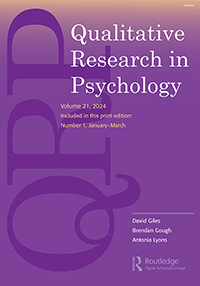论叙事性、知识生产与社会变革:叙事生产方法论与参与行动研究的衍射相遇
IF 4.4
3区 心理学
Q1 PSYCHOLOGY, MULTIDISCIPLINARY
引用次数: 1
摘要
本文章由计算机程序翻译,如有差异,请以英文原文为准。
On narrativity, knowledge production, and social change: a diffractive encounter between the Narrative Productions methodology and Participatory Action-Research
ABSTRACT In this article, we argue for an understanding of engaged social research as an inherently narrative activity that conceptualises both how domination is perpetuated, and the possible ways to transform it. In order to do so, we stage a diffractive encounter between two methodologies that have shaped our past practice: on the one hand, the Narrative Productions methodology (NPM), the focus of this Special Issue, on the other, Participatory Action-Research (PAR). We begin by introducing the Latin American PAR tradition and its relation to narrativity as well as NPM’s roots in the feminist epistemology of Donna Haraway. Later on, we review some of the ways these two methods can benefit from reading their insights from one another. Finally, we synthesise the relation of narrativity and social change. We draw on Karen Barad’s notion of ‘Onto-ethico-epistemology’and the concept of political ontologyto argue that, by engaging in creating the world distinctively, these two methods materialise diverging projects of social justice.
求助全文
通过发布文献求助,成功后即可免费获取论文全文。
去求助
来源期刊

Qualitative Research in Psychology
PSYCHOLOGY, MULTIDISCIPLINARY-
CiteScore
20.00
自引率
0.50%
发文量
14
期刊介绍:
Qualitative Research in Psychology is an international, peer-reviewed journal that publishes high-quality, original research. It aims to become the primary forum for qualitative researchers in all areas of psychology, including cognitive, social, developmental, educational, clinical, health, and forensic psychology. The journal also welcomes psychologically relevant qualitative research from other disciplines. It seeks innovative and pioneering work that advances the field of qualitative research in psychology.
The journal has published state-of-the-art debates on various research approaches, methods, and analytic techniques, such as discourse analysis, interpretative phenomenological analysis, visual analyses, and online research. It has also explored the role of qualitative research in fields like psychosocial studies and feminist psychology. Additionally, the journal has provided informative articles on ethics, transcription, interviewee recruitment, and has introduced innovative research techniques like photovoice, autoethnography, template analysis, and psychogeography.
While the predominant audience consists of psychology professionals using qualitative research methods in academic, clinical, or occupational settings, the journal has an interdisciplinary focus. It aims to raise awareness of psychology as a social science that encompasses various qualitative approaches.
In summary, Qualitative Research in Psychology is a leading forum for qualitative researchers in psychology. It publishes cutting-edge research, explores different research approaches and techniques, and encourages interdisciplinary collaboration.
 求助内容:
求助内容: 应助结果提醒方式:
应助结果提醒方式:


